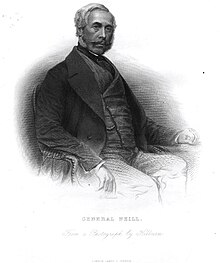James Neill
James George Smith Neill (born May 26, 1810 - September 25, 1857 ) was an officer in the British East India Company who was instrumental in the suppression of the Indian uprising of 1857 . He is one of the British officers who carried out particularly brutal and sadistic reprisals against insurgent sepoys and Indian civilians.
Life
Neill was born in Craigie, near Ayr , Scotland and attended Glasgow University . In 1826 he joined the British East India Company . He received his lieutenant's license in 1828. In 1850 he was appointed major and was one of the active participants in the Second Burma and the Crimean War . He returned to India in the spring of 1857, shortly before the Indian uprising of 1857 began in Merath on May 10 . In Benares he was involved in the suppression of the insurgent troops there on June 4, 1857. In a forced march that lasted from June 6th to June 15th, he then turned to Allahabad , where a group of Europeans and Eurasians in Fort Allahabad were besieged by insurgents. Together with his superior, Sir Henry Havelock , he was one of the troops who recaptured Kanpur from the insurgents. The siege of Kanpur was considered to be one of the most traumatic events of the Indian uprising - from the perspective of the British. There, after several weeks of loss-making resistance, those entrenched in the garrison had accepted Nana Sahib's terms of surrender , which offered them the prospect of a withdrawal by boat to Allahabad. When the British boarded the boats, fire was opened by Indian troops. The men who survived the firefight were executed on the spot. About 125 women and children were brought back to Kanpur, where they were held prisoner in Bibighar together with other refugees - again mostly women and children. Just before Kanpur was retaken by British troops led by Sir Henry Havelock and James Neill, these 73 women and 124 children were murdered.
While Havelock moved on with some of the troops to Lucknow to rush to the aid of the Europeans entrenched there, Neill Kanpur was supposed to stop. As before in Benares and Allahabad, he took brutal retaliatory measures. Indians, regardless of gender or age, were executed when there was little reason to believe that they had previously supported the insurgents. Villages were burned down, even if old people and children were killed. According to James Neill's instructions, those sentenced to execution were consciously humiliated beforehand and deliberately forced to do things that contradicted the religious duties of their respective religion. Hindus were forced to lick parts of the blood-smeared Bibighar with their tongues. Some of them forced to dig their own grave instead of burning them according to the Hindu rite. Muslims were forced to eat pork, sewn into pork skins, or smeared with pork fat before they were executed. The torture that Sikhs inflicted on sepoys prior to their execution was tolerated and encouraged.
James Neill was killed on September 25 in the battle for the British garrison town of Lucknow, which was besieged by insurgent troops. He was first revered in Great Britain as one of the "angels of revenge" in the suppression of the Indian uprising. Immediately after the suppression of the uprising, however, criticism began of the disproportionately brutal retaliation for which James Neill was responsible. Contemporary historians accused James Neill of not rushing to the aid of the garrison town in Kanpur in time because of his revenge measures and complained about his sadistic vengeance measures. The contemporary English politician and writer George Trevelyan even described James Neill as a monster responsible for murderous English warfare.
supporting documents
Single receipts
literature
- Saul David: The Indian Mutiny: 1857 , Penguin Books, 2003
- Christopher Herbert: War of no pity. The Indian Mutiny and Victorian Trauma , Princeton University Press, Princeton 2008, ISBN 978-0-691-13332-4
- Christopher Hibbert: The great mutiny: India 1857 , London [u. a.]: Penguin Books, 1988
- Lawrence James: Raj - The Making of British India , Abacus, London 1997, ISBN 978-0-349-11012-7
- AN Wilson: The Victorians . Arrow Books, London 2003. ISBN 0-09-945186-7
| personal data | |
|---|---|
| SURNAME | Neill, James |
| ALTERNATIVE NAMES | Neill, James George Smith (full name) |
| BRIEF DESCRIPTION | British East India Company officer |
| DATE OF BIRTH | May 26, 1810 |
| DATE OF DEATH | September 25, 1857 |
